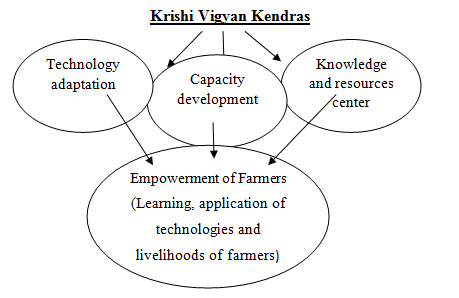Authors: Chandra Kant Tripathi, Swati Deepak Dubey, Krishna Deepak Tripathi
Evolution of KVK
The first Krishi Vigyan Kendras (KVK) was established in 1974 at Pondicherry. The initial idea behind the establhisment of KVKs was to provide vocational education in agriculture and allied sectors for the pre and post matriculate levels rural youth. Subsequently objectives and mandate has been changed according to need of the agriculture. Thus Krishi Vigyan Kendras is acting as innovative institutions for imparting vocational training to the practicing farmers, school dropouts and field level extension functionaries. During each plan period, performance of KVKs was reviewed and more and more KVKs were established in the country successively. On the occasion of the independence Day Speech on 15th August, 2005, the Hon‘ble Prime Minister of India announced that by the end of 2007 there should be one KVK in each of the rural districts of the country. To the date there are 660 KVKs are working established in the country.
Design of KVK:

Mandates of KVKs:
(1) Organizing frontline demonstrations (FLD) to establish production potential of various crops and enterprises on the farmers fields.
(2) Conducting on-farm testing (OFT) to identify the location specificity of agricultural technologies under various farming systems.
(3) Organizing need based training of farmers to update their knowledge and skills in modern agricultural technologies related to technology assessment, refinement and demonstration, and training of extension personnel to orient them in the frontier areas of technology development.
(4) Creating awareness about improved technologies to larger masses through appropriate extension programmes.
(5) Production and supply of good quality seeds and planting materials, livestock, poultry and fisheries breeds and products and various bio-products to the farming community.
(6) Work as resource and knowledge centre of agricultural technology for supporting initiatives of public, private and voluntary sector for improving the agricultural economy of the district.
Strategies of Working KVKs:
By taking into account the productivity, production and income of the farmers in totality for the development of sustainable agriculture following strategies are adopted-
Remunerative agriculture: To increase productivity & production, minimize the post-harvest losses, value addition for enhance farmers income and livelihood security. Thus, remunerative agriculture ultimately resulted in sustainability.
Climate smart agriculture: To cope up with changing climate it is necessary to train farmers in conservation of soil & water, bio-conservation, reducing environmental pollution, climate resilience and increasing productivity and production of greenhouse/protected cultivation.
Food and dietary diversification agriculture: with increasing population demand for food and nutrition has been increased. In addition to this modern uniform agriculture resulted in the serious threat to food diversity. So, to remove malnutrition, nutritional disorders, year round house hold food security, stable and sustainable food supplies, improving livelihood at grass root level through convergence of all schemes for eliminating hunger and poverty it become essential to motivate farmers for food and dietary diversification agriculture.
Output of KVKs:
KVKs thus, continuously work for farmers and rural agriculture. Most of the technologies are developed in the labs but for all the technologies to reach to the farmers role of KVKs is very important. KVKs are the down to earth institution enormously working for vocational training, on farm research training and transfer of latest technologies up to the farmers and rural agriculture. Thus, KVKs serve as the light house for the overall rural development in the district.
Figure: Impact of Technologies Disseminated by KVKs.

Source: Primary Survey of National Institute of Labour Economics Research and Development (NILERD), 2015.
About Author / Additional Info:
I am Currently working as Subject matter specialist in KVK, Sultanpur